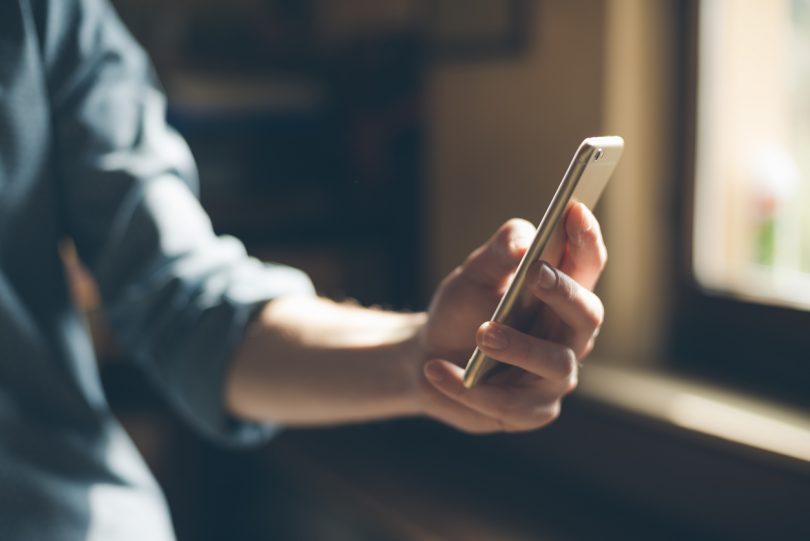
Does the government really need to know every location you’ve visited and who else was there? Photo: File.
Do you trust the Federal Government enough to sign up to their COVID-19 app? Emma Davidson, who has a background in private sector software development and is an ACT Greens candidate, argues we should have serious concerns about the Government’s intentions. What do you think?
The Federal Government is developing an app to track who a person with COVID-19 has been in contact with. Minister for Government Services Stuart Robert says it may help in easing physical distancing restrictions. But I believe there are serious privacy concerns, and that it is unlikely to reduce virus transmission.
Prime Minister Scott Morrison says that Australians can’t be trusted to tell the truth about who they’ve been in contact with, so we all need to give up our privacy to protect the community. At least 40 per cent of Australians will need to use the app to make it effective in tracing contacts.
Australians are wary of government agencies as data custodians. Millions opted out of the MyHealth record scheme in early 2019, not helped by cases like the Queensland police officer who provided a woman’s home address to her abusive ex partner.
Many Canberrans still remember George Brandis as Attorney-General in 2014 describing metadata as the name and address on an envelope, demonstrating a lack of understanding about how metadata could be used to reveal an individual’s private life.
Mr Robert was also criticised recently for blaming a MyGov website outage on a distributed denial of service attack, rather than a simple case of website failure.
Developers for the Australian Government app have looked at the source code for TraceTogether, used by 20 per cent of Singapore residents. TraceTogether uses Bluetooth to detect when two phones using the app are in close proximity, so health authorities can notify users if they have been in contact with someone who later tested positive for COVID-19.
But University of Melbourne researchers found that TraceTogether sends data to a centralised server, where it may be kept indefinitely and accessed by government agencies for other purposes.
Apple and Google have also developed a contact tracing framework. Low energy Bluetooth measures the distance between two contacts (based on signal strength) and runs in the background with less battery impact than GPS tracking.
Encrypted mobile numbers of contacts would be stored on a user’s phone for 14 days, and then deleted. If a user tells the app they have tested positive, a message could be automatically sent to recent close contacts. Unlike TraceTogether, Apple and Google’s framework does not rely on health authorities to send messages, and does not require data to be stored in a centralised database.
It is not clear whether the Australian app will use Bluetooth or GPS. If the Australian app uses GPS, it will have logs of the location of the user, and anyone else nearby – more data than is needed for contact tracing.
Robert has said the user would need to consent to health authorities using the encrypted data in the app to identify recent close contacts, indicating there may be a centralised database or a way for government agencies to decrypt data stored on phones.
With the likelihood that take-up in Australia will be lower than in Singapore, the app will not work for contact tracing. But it may convince some Australians to hand over their location data and a list of known contacts to government agencies.
If that happens, we may see fewer situations like police going through journalist Annika Smethurst’s underwear drawer. Instead, government agencies can just check the database, and we’ll have no way of knowing what they’re accessing or how often.
While the government is having conniptions over their inability to track our movements, our community is coming together to take care of each other.
They’re setting up mutual aid groups and community pantries. They’re donating to charity organisations. They’re donating blood. They’re supporting local restaurants that have switched to takeaways. They’re calling their neighbours and family and friends to ask how they’re doing. They’re staying home. This is the country I live in, and these are the people I trust to do the best we all can to reduce the spread of the virus.
I call on the NSW Premier and ACT Chief Minister to tell the Prime Minister we won’t support the use of this app unless he can show it won’t collect any more data than is truly needed, won’t be stored in a centralised database, and can’t be decrypted by thousands of government agency employees who don’t need access to our every move.
Emma Davidson is the ACT Greens candidate for Murrumbidgee and spokesperson on democracy and community engagement.
Original Article published by Emma Davidson on The RiotACT.






